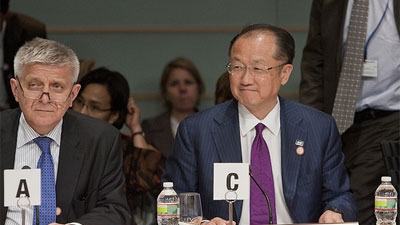April 20, 2013— After a decade of sustained economic growth and falling poverty in developing countries, the World Bank Group has a “historic opportunity” to help end extreme poverty within a generation, the Development Committee said at the close of the 2013 World Bank-IMF Spring Meetings.
The ministers backed the goal put forward by World Bank Group President Jim Yong Kim to reduce the number of people living on $1.25 a day to 3% or less of the world’s population by 2030, said Chairman Marek Belka.
“We have set an expiration date for extreme poverty. With commitment, cooperation, and the vision of leaders from around the world, we have great faith that we can make it happen,” said Dr. Kim.
The goal includes fostering income growth and “shared prosperity” for the bottom 40% of every country – which will entail reducing inequality, promoting gender equality, and creating opportunities for all citizens.
“Ministers unequivocally supported Dr. Kim’s vision and stated that we can count on the World Bank Group as a partner in the endeavor of ending extreme poverty and boosting shared prosperity,” said Belka.
With just a 17-year window, reaching these goals “will be hard work,” said Dr. Kim.
It will also require that developing countries keep growing quickly, and that some of the poorest countries in the world reduce poverty at a much faster rate than they have to date.
The Bank Group will have to pay “special attention” to these countries, and to the world’s fragile and conflict-affected situations.
In its communiqué, the Development Committee urged countries to back IDA, the World Bank’s fund for the poorest, especially in support of the world’s fragile states. Ministers also called on the Bank to step up support for the Millennium Development Goals, which promote human development, such as health care and education, and enable countries to grow more quickly. “We call for a robust IDA17 replenishment with strong participation from all members,” the Committee said.
“Investment in people, especially in health and education, is the right thing to do, both from a moral and a strategic perspective,” said Dr. Kim.
To speed progress in reducing poverty, the Bank won support for its plan to develop a “science of delivery” to promote data-gathering, evidence-based development, and improved public services in developing countries.
“We will bring the urgency of the task to the world every year by reporting on our progress, country by country, on the rate of extreme poverty around the world as well as the changes in the income of the bottom 40% in each country, the people who are vulnerable to slipping back into poverty in event of losing a job or suffering a health crisis. We will learn every year where we are making progress and where we are not,” said Dr. Kim.
The Development Committee called on the Bank Group to help countries in the Sahel and Horn of Africa build resilience to crisis by “deepening its commitments on infrastructure, job creation, social reintegration, agricultural production and food security.”
The ministers also addressed concern over climate change by encouraging the Bank to support countries that want to catalyze low-carbon growth and climate resilience in cities, scale-up climate-smart agriculture, and phase-out fossil fuel subsidies, “with due regard to affordability of energy for the poor.”

